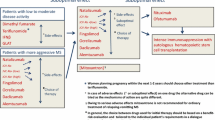Abstract.
Intravenous immunoglobulin (IVIG) is an established therapy for a number of neuroimmune disorders, including Guillain-Barré syndrome and chronic inflammatory demyelinating polyneuropathy. IVIG exerts a number of effects that may be beneficial in multiple sclerosis (MS): reduction of inflammation, inhibition of macrophages, and promotion of remyelination. Four double-blind trials have been performed of IVIG in relapsing-remitting MS. A meta-analysis of the four trials has shown that IVIG reduces the relapse rate, new MRI lesions, and disease progression. IVIG does not seem to be of any benefit in chronic visual or motor symptoms in MS. In secondary progressive MS, IVIG has not shown effect on disease progression, relapses or new MRI lesions. In conclusion, IVIG is an alternative second-line treatment to approved therapies in relapsing-remitting MS, but the ideal dosage of IVIG still needs to be determined.
Similar content being viewed by others
Author information
Authors and Affiliations
Rights and permissions
About this article
Cite this article
Sørensen, P.S. Treatment of multiple sclerosis with intravenous immunoglobulin: review of clinical trials. Neurol Sci 24 (Suppl 4), s227–s230 (2003). https://doi.org/10.1007/s10072-003-0083-5
Issue Date:
DOI: https://doi.org/10.1007/s10072-003-0083-5




